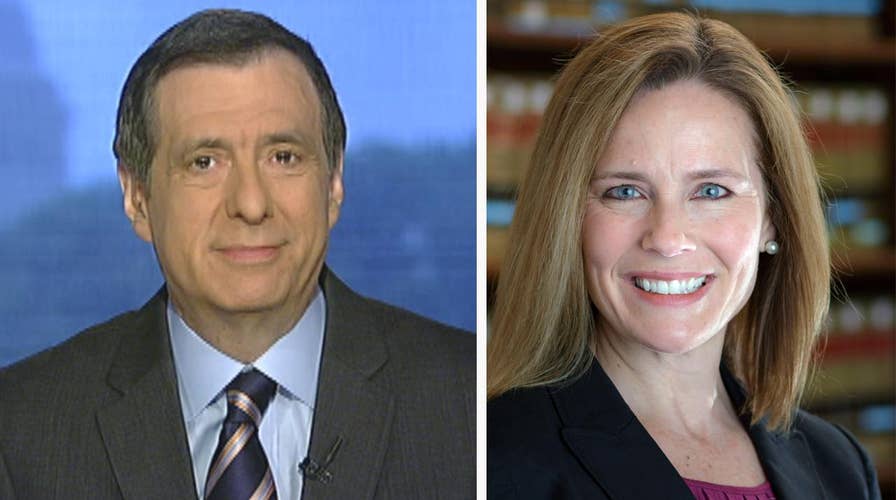Kurtz: SCOTUS candidate sparks religious liberty debate
'MediaBuzz' host Howard Kurtz weighs in on the media debate over US Circuit Judge, Amy Coney Barrett, as a potential pick for the Supreme Court to replace Justice Anthony Kennedy.
The Supreme speculation is under way, and the media powers that be are focusing on a woman who they are already casting as controversial.
Amy Coney Barrett, a federal appeals court judge in Chicago, is definitely on the short list for the high court and is one of a handful of candidates who has met with President Trump. None of the pundits, obviously has any idea whether the president will pick her.
But you can kind of sense that the press is rooting for her, if only because she'd be a better story than the other contenders.
So you have this odd situation where the press is doing research—some would say opposition research—on potential nominees such as Barrett and Brett Kavanaugh, which will instantly be moot for everyone except the president's choice next week.
In theory, the president should pick the most qualified lawyer who is most aligned with his philosophy. But some conservatives are already saying that optics matter, and a woman would be an especially good choice—especially if she ends up casting the fifth and deciding vote to overturn Roe v. Wade.
Gender mattered when Ronald Reagan made Sandra Day O'Connor the first woman on the Supreme Court. And obviously it mattered for Ruth Bader Ginsburg, Sonia Sotomayor and Elena Kagan.
If Trump does choose Barrett—and he has said he'd like to pick a woman—she would be only the second female justice appointed by a Republican president.
The Washington Post summarizes the sales pitch: "She's young (46), good on her feet, telegenic, unmistakably conservative and, with seven children, has the kind of family you want sitting behind you during tense confirmation hearings."
And unlike Neil Gorsuch, the paper says, "she's a woman," and that would matter in the interrogation she’ll face over Roe.
But would Barrett (or any appointee) be an automatic vote to overturn the 1973 decision on abortion? Back in 2013, she said, "I think it is very unlikely at this point that the court is going to overturn Roe." She added that "the controversy right now is about funding; it's a question of whether abortions will be publicly or privately funded."
That, of course, does not mean that a Justice Barrett definitely would not cast such a vote.
And as the Los Angeles Times notes, Barrett "has been unusually frank in her support for overturning precedents that are not in line with the Constitution." Barrett wrote in a 2013 law review article that the principle of generally respecting past rulings, known as stare decisis, "is not a hard-and-fast rule in the court's constitutional cases."
If Barrett, a devout Catholic, is the nominee, it's virtually guaranteed there will also be a debate over religious liberty.
Barrett, says Politico, is "a hero to religious conservatives who believe liberal Democrats target them for their faith." That happened during her confirmation hearing last year.
Dianne Feinstein pressed her on separating her judicial analysis from her religious beliefs, with this statement: "The dogma lives loudly within you, and that's of concern when you come to big issues that people have fought for for years in this country."
Politico quotes National Review senior editor Ramesh Ponnuru as saying "you can make the case that if she is nominated to the Supreme Court that she will have Feinstein in part to thank for that."
Some conservatives are pointing to a New York Times piece last year that noted Barrett’s membership "in a small, tightly knit Christian group called People of Praise" in which members "swear a lifelong oath of loyalty ... Current and former members say that the heads and handmaids give direction on important decisions, including whom to date or marry, where to live, whether to take a job or buy a home, and how to raise children."
But a leader of the group, Craig Lent, is quoted as saying "we don't try to control people" and "there's never any guarantee that the leader is always right. You have to discern and act in the Lord."
David French, in National Review, writes that Barrett is "widely acknowledged to be a brilliant law professor, and she's a role model for Christian professionals who are committed to excellence in their careers and to loving Christ, their families, and their neighbors. If she's deemed unfit for the Supreme Court, then the religious test is alive and well."
Trump has to weigh many factors, but he might welcome a debate over a nominee's religious beliefs as a way of galvanizing his base.
Ultimately the White House has to vet whatever candidate Trump picks. But the media are already vetting people like Amy Barrett in advance.





